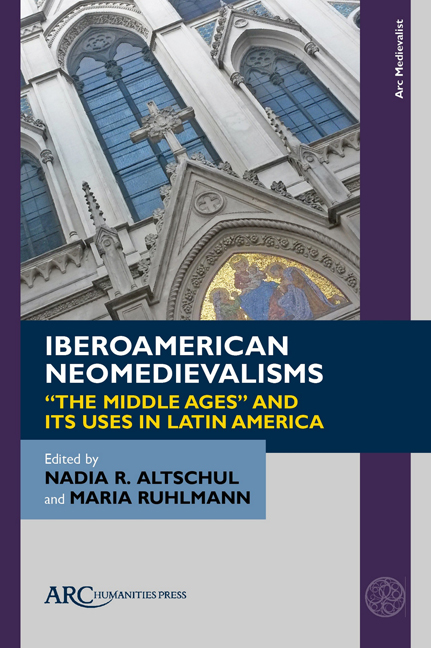Book contents
- Frontmatter
- Contents
- List of Illustrations
- Chapter 1 Postcolonizing Neomedievalism:An Introduction
- Chapter 2 The Criollo Invention of the Middle Ages
- Chapter 3 A Militant and Peasant-Based Medieval History in Brazil: Fanning the Spark of Hope
- Chapter 4 Neomedievalism and the Hagiography of Valdemiro Santiago: Neopentecostal Sanctification
- Chapter 5 The “Middle Ages” in the Brazilian Presidential Elections of 2018: The Left, the Right, and the Centre
- Chapter 6 Averroes in Mid-Colonial and Inter-Imperial Cordoba
- Chapter 7 Hypermedievalizing and De-Medievalizing Dante: Leopoldo Lugones’s and Jorge Luis Borges’s Rewritings of Inferno V
- Chapter 8 Borges and Kennings
- Chapter 9 Memory, Desire, and Sexual Identity in Manuel Mujica Lainez’s El unicornio
- Chapter 10 Rewriting and Visualizing the Cid: The Reconstruction of Medieval Gender and Race in Argentinian Graphic Novels
Chapter 1 - Postcolonizing Neomedievalism:An Introduction
Published online by Cambridge University Press: 18 November 2023
- Frontmatter
- Contents
- List of Illustrations
- Chapter 1 Postcolonizing Neomedievalism:An Introduction
- Chapter 2 The Criollo Invention of the Middle Ages
- Chapter 3 A Militant and Peasant-Based Medieval History in Brazil: Fanning the Spark of Hope
- Chapter 4 Neomedievalism and the Hagiography of Valdemiro Santiago: Neopentecostal Sanctification
- Chapter 5 The “Middle Ages” in the Brazilian Presidential Elections of 2018: The Left, the Right, and the Centre
- Chapter 6 Averroes in Mid-Colonial and Inter-Imperial Cordoba
- Chapter 7 Hypermedievalizing and De-Medievalizing Dante: Leopoldo Lugones’s and Jorge Luis Borges’s Rewritings of Inferno V
- Chapter 8 Borges and Kennings
- Chapter 9 Memory, Desire, and Sexual Identity in Manuel Mujica Lainez’s El unicornio
- Chapter 10 Rewriting and Visualizing the Cid: The Reconstruction of Medieval Gender and Race in Argentinian Graphic Novels
Summary
Foundations can become so entrenched in the disciplinary histories we tell ourselves that we forget to revisit and modify them. This introductory essay aims to revisit the foundations of what is commonly defined as the field studying the redeployment of the Middle Ages in post-medieval times, named “Medievalism,” by Leslie J. Workman, the founder of the field's first academic journal Studies in Medievalism and of its institutional life through the International Society for the Study of Medievalism. A first point to make in seeking to postcolonize neomedievalism is to note that the main problem consistently identified for the field is its lack of proper theorization. Elizabeth Emery and Richard Utz explain in their introduction to the main attempt at that theorizing— their 2014 Medievalism: Key Critical Terms—that the field “still has no systematic theoretical map,” and practitioners do not always address explicitly “the critical underpinnings of medievalism.” Their stated hope was for this edited volume to establish that the field is indeed “implicated in theoretical considerations,” or at least to “generate dialogue” about those theoretical foundations through the contested vocabulary of key critical terms. Workman himself had stated in 1993 that basic exploration was needed before adopting a “real critical and philosophical appreciation”; yet by 1995 he argued instead that the “theory, method, and philosophy of medievalism are long overdue for exploration.” In the late 1990s, Workman was still identifying “a desperate need for… something that at least sets out the questions.” As evidenced by the 2014 volume on critical terms, this need still has not been fully met. We might even say that instead of being resolved, by 2021 this need has migrated to new grounds, still defined as too mutable to allow theoretical focus instead of a concentration on praxis.5 In answer to this lack of explicit theorization, this introduction examines the foundational ideological underpinnings of Workman's field. I will propose that the area of study we should instead call “Neomedievalism” is in need of a postcolonial approach to come into its own, and that the field at large can become productively broader and more inclusive as it reevaluates the lineaments established in its foundations.
- Type
- Chapter
- Information
- Iberoamerican NeomedievalismsThe Middle Ages' and Its Uses in Latin America, pp. 1 - 18Publisher: Amsterdam University PressPrint publication year: 2023
- 2
- Cited by

